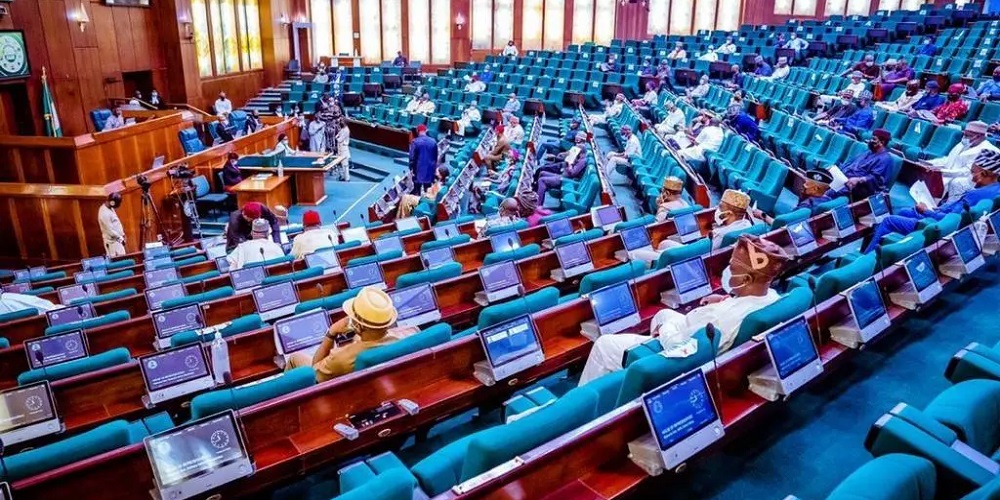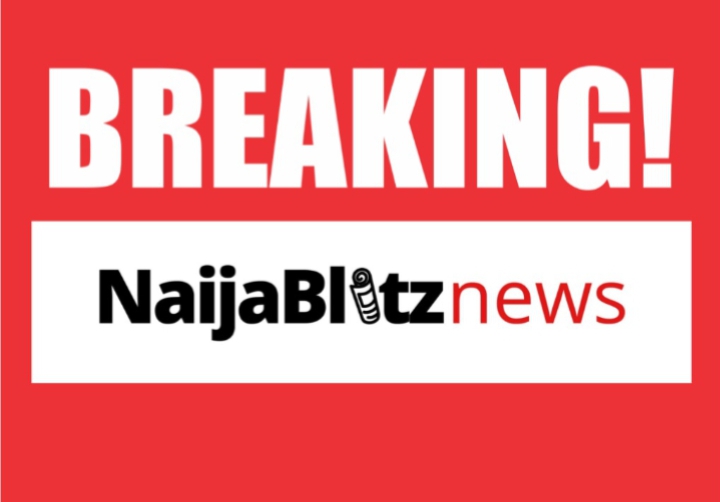News
Reps Direct NASS Leadership To Intervene In Plateau State Assembly Crisis

News
White smoke rises, new pope elected at Vatican +Video

By Francesca Hangeior
White smoke billowed from the chimney of the Sistine Chapel on Thursday, signalling that cardinals locked inside have elected a new leader for the world’s 1.4 billion Catholics.
Thousands of pilgrims and curious onlookers in St Peter’s Square cheered and applauded as the smoke appeared and bells began to ring, indicating the 2,000-year-old institution has its 267th pope.
All eyes now turn to the balcony of St Peter’s Basilica to see who has been elected to succeed Pope Francis, an Argentine reformer who died last month after 12 years as leader of the worldwide Church.
The new pontiff will be introduced in Latin with his chosen papal name and address the world for the first time.
He faces a momentous task: as well as asserting his moral voice on a conflict-torn global stage, he faces burning Church issues from the continued fall-out from the sexual abuse scandal to the Vatican’s troubled balance sheets.
Some 133 “Princes of the Church” from five continents — the largest conclave ever — began voting on Wednesday afternoon.
Sworn to secrecy, on pain of excommunication, their only means of communicating their progress to the outside world was by sending up smoke through the chimney of the Sistine Chapel.
On Wednesday evening and then again on Thursday lunchtime, the smoke was black, emitting disappointed sighs from the tens of thousands watching.
But on Thursday afternoon just after 6pm (1600 GMT) the smoke emitted was white, confirming that the Catholic Church has a new spiritual leader.
By tradition, he now enters the Room of Tears — where freshly-elected popes give free rein to their emotions — to don a papal cassock for the first time, before returning to the Sistine Chapel so the cardinals can pledge their obedience.
He will then appear on the balcony along with a senior cardinal, who will announce to the waiting crowds “Habemus Papem” (“We have a pope”).
The pope will then give a short speech and impart his first “Urbi et Orbi” (“To the City and the World”) blessing.
The election has come at a time of great geopolitical uncertainty, which was seen as a key voting issue, along with the rifts within the Church.
Francis was a compassionate reformer who prioritised migrants and the environment, but he angered traditionalists who wanted a defender of doctrine rather than a headline-maker.
Some 80 percent of the cardinal electors were appointed by Francis. Hailing from 70 countries around the world, it was the most international conclave ever.
That was no guarantee, however, that the cardinals would pick someone in his vein.
The question was whether to choose a pastor or diplomat, a liberal or conservative, someone versed in the Curia — the Church’s governing body — or a relative outsider from areas of the world where Catholic faith is thriving.
Before the cardinals were locked into the Sistine Chapel Wednesday, their dean Giovanni Battista Re urged them to choose someone able to protect the Church’s unity.
The next pope must also be able to lead “at this difficult and complex turning point in history”, amid raging conflicts around the world and the rise of ultra-nationalist parties.
The Church has also had difficulty in adapting to the modern world, with declining priest numbers and increasingly empty pews in the West.
The papal inauguration usually takes place less than a week after the election with a mass celebrated before political and religious leaders from around the world.
The new pope will likely do a tour of St Peter’s Square in his popemobile for the first time, before delivering a homily outlining his priorities.
News
Meet the new Pope, Pope Leo XIV +Photo

By Francesca Hangeior
Formerly Cardinal Robert Francis Prevost, he hails from the United States and is the first American to be elected pope in the history of the Roman Catholic Church.
A member of the Augustinian order and former Prefect of the Dicastery for Bishops, Pope Leo XIV brings decades of pastoral and administrative experience to the papacy.
He is a moderate who was close to Pope Francis and spent years as a missionary in Peru, he becomes the Catholic Church’s 267th pontiff, taking the papal name Leo XIV.
News
BREAKING! Finally, White Smoke Emerges From Sistine Chapel as Vatican Elects New Pope

Finally, white smoke emerged from the Sistine Chapel on the evening of Thursday, May 8, signalling that the Vatican has elected a new Pope. The cardinal selected to succeed Pope Francis will be announced in due course.
On Wednesday, 133 cardinals entered the chapel for a deeply choreographed ritual that has preceded the election of every Pope since 1179. The first session started with a vow of secrecy—excommunication awaits anyone who leaks details of the votes—followed by the vote.
Once the numbers were tallied, the votes were burned in a special stove set up inside the chapel. Yesterday’s black smoke informed the public that the cardinals had yet to make their decision.
The papal conclave is a centuries-old process with modern-day consequences.
Francis’ 12-year pontificate was pivotal, not just for the church, but for the globe. His advocacy for care of migrants and the poor, his tolerance for homosexuality, and his denunciation of climate change and conflicts in Gaza and Ukraine helped reset the world’s moral compass.
Yet within the church, his reformist interpretation of church doctrine—”Who am I to judge?” he famously responded when asked to weigh in on gay priests—set off a polarizing struggle between modernists and traditionalists. So too has his big tent inclusivity that welcomed practitioners of all kinds, and invited many of them, even members of the LGBTQ community and lay women, to sit with bishops and contribute their thoughts on the direction of the church in meetings called synods. It is this vision of synodality—the church as a listening one instead of a top-down enforcer of doctrine—that is at the core of Francis’ progressivism, and the biggest threat to traditionalists who want to maintain the power and influence of bishops and cardinals.
Every conclave, at its most fundamental, is a referendum on the previous pope’s legacy. Behind closed doors and sworn to secrecy, the cardinals will have had to decide if the new pope is one to continue on Francis’ radically inclusive path, or someone who will roll back his policies in favor of a more inward-looking church focused on doctrine.
That will have repercussions in a tense historical moment of religious and ethnic strife exacerbated by conflict, climate change, rising nationalism and anti-migrant sentiment are coming to the fore, says Alberto Melloni, a Vatican historian who is the director of the John XXIII Foundation for Religious Sciences in Bologna, Italy. There are relatively few global figures who can move opinion, drive conversation, and call for change like a pope. “It will be very different if we have a pope who is more worried about ideological topics of tradition than someone who makes the unity of the human family and care for the planet the first point in his agenda,” says Melloni.
There are 252 cardinals, but only those under the age of 80 took part in the conclave. Of the 133 cardinals that voted, Francis appointed 108.
Over the past several years, Francis sought to elevate bishops from underrepresented places such as Myanmar, Rwanda, and East Timor to the college of cardinals to better represent the scope of global Catholicism. Coming from wildly varying cultural backgrounds, they do not align on any consistent ideological spectrum. Many of them are more conservative on issues of homosexuality and women, even if they embrace Francis’ focus on other kinds of inclusivity. That made for a very unpredictable vote, says Melloni. “It is not liberals vs. conservatives. It is not donkeys and elephants facing one another across the aisle. It is a collage of people divided into very small groups,” aligned by theological leanings, doctrinal philosophy, or missionary experience.
Given the stakes, the competing agendas, and the constantly shifting micro alliances and priorities, it was impossible to predict from the outset who will ultimately get support from two-thirds of a very divided electorate, faced with one of the most, if not the most, important decisions of their career. “The only thing we can say with any confidence is that we’ll have a male pope,” says Melloni, when pressed to hazard a guess for the outcome ahead of the papal election.
Most of the politicking has already been done, conducted in private over informal meetings and at dinners in the nearby guesthouse where the cardinals stay. Overt campaigning is frowned upon, but it is not uncommon for trusted “kingmaker” cardinals to push for the candidates that share their values and vision for the church.
Once a papal election starts, the cardinals cannot leave the conclave except in rare cases, and they are cut off from the rest of the word, with no access to phones, the internet or even newspapers (the word conclave comes from the Latin “with key,” as in, locked up.)
Inside the chapel, the electors share a brief prayer and take an oath to observe the sanctity of the process before handwriting the name of their chosen candidate on a piece of folded paper. One by one, the cardinals will deposit their votes in a special urn. Once voting is done, the votes are tallied, then burned.
-

 Entertainment14 hours ago
Entertainment14 hours agoI’m broke yet accused of money laundering – VDM breaks silence after EFCC release
-

 News24 hours ago
News24 hours agoJust in: Finally, EFCC bows to pressure, releases VDM
-

 News1 hour ago
News1 hour agoBREAKING! Finally, White Smoke Emerges From Sistine Chapel as Vatican Elects New Pope
-

 News6 hours ago
News6 hours agoBreaking: Three Serving PDP HoR Members Defect to APC
-

 News14 hours ago
News14 hours agoTomato Ebola Causes Loss of N1.3 Billion, Contributing to Rising Food Prices
-

 News14 hours ago
News14 hours agoEdo police rescue kidnapped PDP chairman, 36 others
-

 News7 hours ago
News7 hours agoFinally, IMF deletes Nigeria from its debtors list
-

 News14 hours ago
News14 hours agoSad! Five members of one family die of food poisoning





